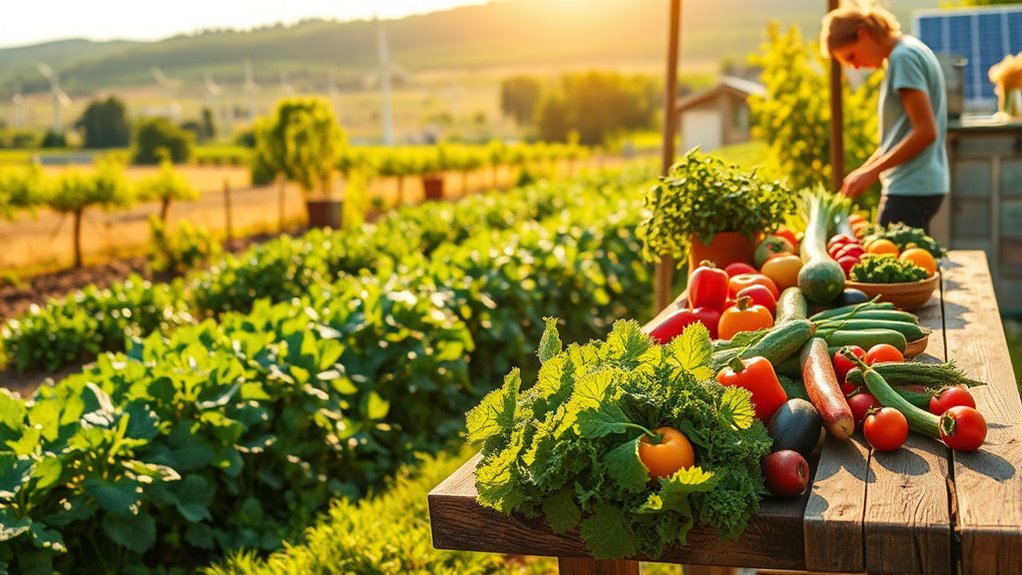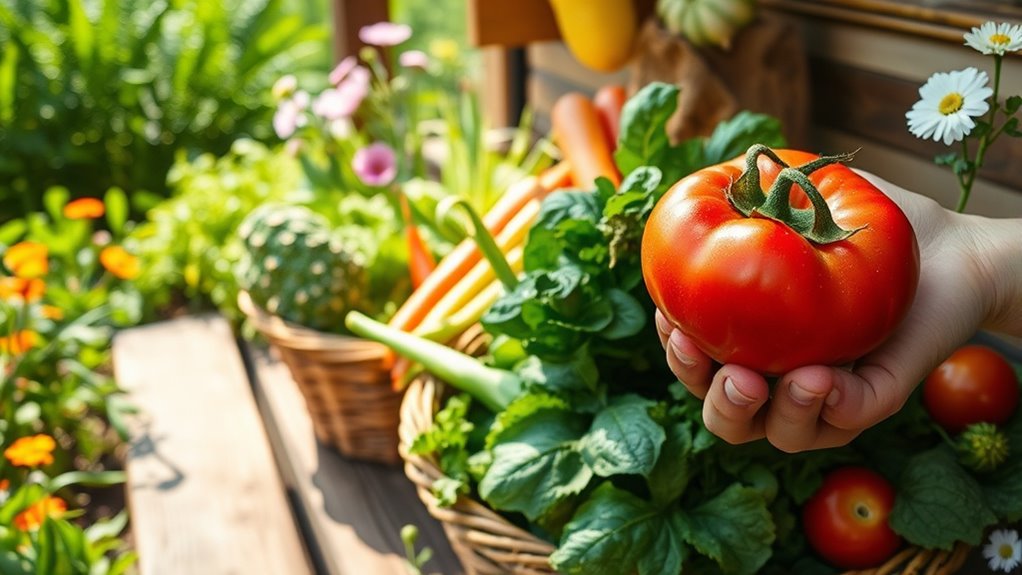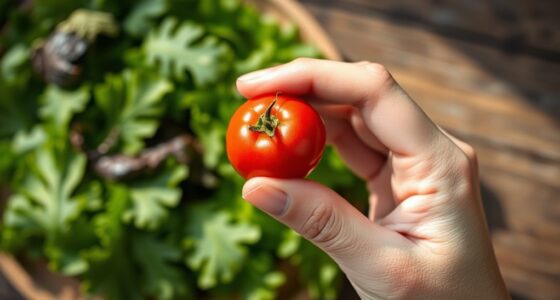Eating a raw diet helps you live more sustainably by reducing your reliance on processed foods that generate packaging waste and require energy for manufacturing and transport. It encourages buying local, seasonal produce, which cuts carbon emissions and supports nearby farmers. Plus, it promotes plant-based eating, conserving water and land resources. By adopting this lifestyle, you lower household waste and energy use. Learn how these small changes can make a big environmental difference.
Key Takeaways
- Reduces reliance on processed foods and packaging, lowering household waste and environmental footprint.
- Supports local farmers and seasonal produce, decreasing transportation emissions and promoting sustainable agriculture.
- Encourages plant-based eating, conserving water and land resources compared to traditional animal-based diets.
- Promotes zero waste practices through reusable containers, composting, and mindful purchasing habits.
- Minimizes energy use in meal preparation, decreasing household energy consumption and carbon emissions.

Choosing eco-friendly options not only helps protect the environment but also offers numerous personal and financial benefits. When you adopt a raw diet, you naturally lean toward plant-based practices that minimize your ecological footprint. By consuming mostly fresh fruits, vegetables, nuts, and seeds, you reduce reliance on processed foods that often involve excessive packaging, preservatives, and transportation emissions. This shift supports zero waste initiatives by encouraging you to buy in bulk, use reusable containers, and avoid single-use plastics. As a result, you generate less waste, contributing to a cleaner environment and less clutter in your home.
Switching to a raw diet aligns with sustainable living because it emphasizes locally sourced, seasonal produce. When you buy locally, you cut down on the carbon emissions linked to long-distance transportation. Plus, you support local farmers and reduce the demand for industrial agriculture, which is often associated with deforestation, water pollution, and pesticide overuse. This approach not only helps preserve natural ecosystems but also promotes a more resilient and sustainable food system. The focus on plant-based foods inherently reduces your carbon footprint, since plant agriculture generally requires fewer resources—like water and land—compared to raising animals for meat.
Buying local, seasonal produce reduces transportation emissions and supports sustainable, resilient food systems.
Adopting a raw diet also encourages mindfulness about your consumption habits. You become more aware of where your food comes from and how it’s produced, inspiring you to choose ethically sourced, organic options whenever possible. This awareness promotes a more sustainable lifestyle by supporting practices that prioritize environmental health and animal welfare. Additionally, preparing raw meals often involves minimal cooking, which reduces energy consumption in your household. You’ll find yourself spending less on utilities, further boosting your savings.
Incorporating plant-based practices into your daily routine can also motivate you to reduce waste in other areas of your life. For example, opting for reusable produce bags, glass jars, and composting food scraps aligns with zero waste principles. Over time, these habits become second nature, helping you lower your overall waste output. This not only benefits the environment but also fosters a sense of community responsibility, encouraging others around you to adopt similar practices. Moreover, understanding the importance of vertical storage solutions can help you organize your space more efficiently, reducing clutter and making sustainable living more manageable.
Frequently Asked Questions
How Does a Raw Diet Reduce Carbon Footprint Compared to Cooked Foods?
You can reduce your carbon footprint by choosing a raw diet because it requires less energy efficiency in food preparation. Cooking foods often involves significant energy use, leading to higher greenhouse gases emissions. Raw diets minimize this energy consumption, helping to lower your overall contribution to climate change. By eating raw, you’re making a simple change that supports a more sustainable lifestyle and reduces the environmental impact of your food choices.
Are Raw Foods More Environmentally Sustainable Than Processed Alternatives?
When you think about it, raw foods are often more environmentally sustainable than processed options. You avoid energy-intensive food processing, which cuts down on energy consumption and reduces your carbon footprint. Processed foods usually require packaging and preservatives, adding to waste. By choosing raw, you’re not only eating cleaner but also supporting a more sustainable lifestyle, proving that sometimes, less is more.
What Are the Water Conservation Benefits of a Raw Diet?
A raw diet enhances water efficiency because it typically involves less water-intensive processing compared to cooked or processed foods. By choosing raw, you support conservation strategies that reduce water use during food production. This means you’re actively helping conserve water resources and minimize waste. Opting for raw foods aligns with sustainable choices, making your diet not only healthier but also more eco-friendly by conserving essential water supplies.
Can a Raw Diet Help Reduce Food Waste and Packaging Waste?
A raw diet can help reduce food waste and packaging waste because you buy fresh, whole foods with minimal packaging, cutting down on excess plastic and wrappers. Plus, you’re more likely to compost scraps like peels and stems using composting methods, which decreases landfill waste. By focusing on whole, unprocessed foods, you naturally reduce reliance on heavily packaged products, making your diet more eco-friendly overall.
How Does Choosing Raw Foods Support Local and Organic Farming?
Choosing raw foods can seemingly transform your impact on the world. By prioritizing local farming and organic sourcing, you support small-scale farmers, reduce the carbon footprint of transportation, and promote sustainable agriculture. This choice encourages a thriving local economy, preserves farmland, and minimizes chemical use. When you opt for raw, organic foods, you’re actively nurturing a healthier planet while enjoying fresher, more nutritious produce directly from local sources.
Conclusion
Switching to a raw diet isn’t just good for your health—it’s a smart move for the planet too. Some experts believe that eating minimally processed foods reduces energy use and waste, promoting sustainability. While this theory is promising, ongoing research suggests that the overall environmental impact depends on factors like sourcing and food transportation. By choosing local, organic raw foods, you can genuinely make a positive difference for both your well-being and the environment.










